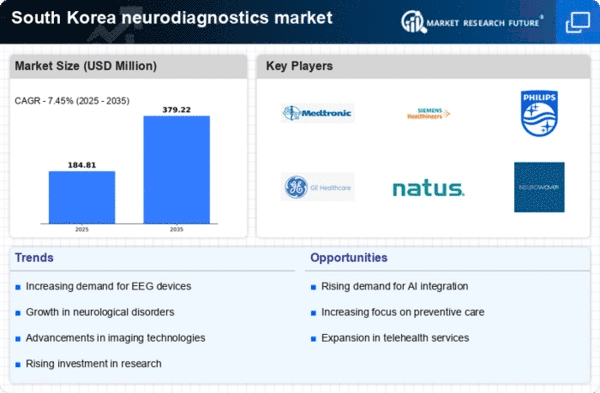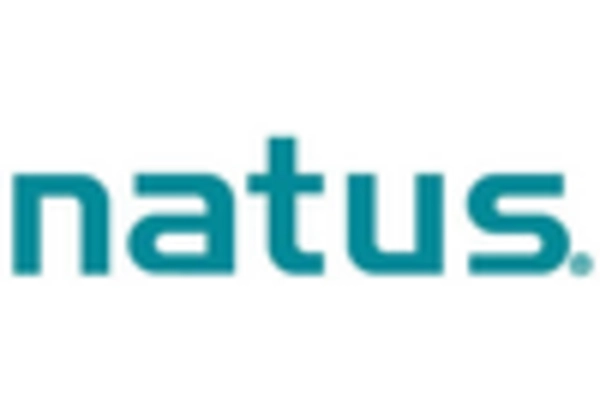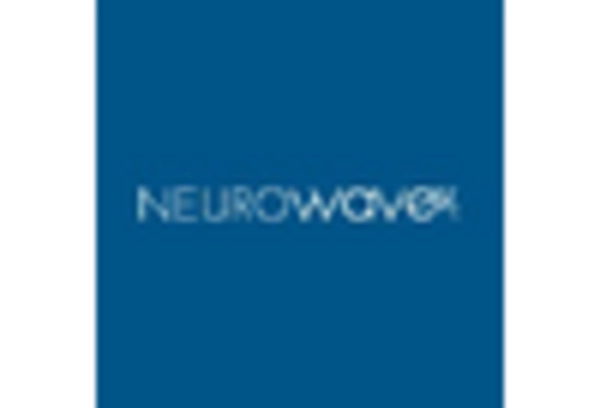Rising Demand for Diagnostic Accuracy
The neurodiagnostics market in South Korea is experiencing a notable increase in demand for diagnostic accuracy. As healthcare providers strive to enhance patient outcomes, the need for precise and reliable diagnostic tools becomes paramount. This trend is driven by the growing awareness of neurological disorders and the importance of early detection. In 2025, the market is projected to reach approximately $1.5 billion, reflecting a compound annual growth rate (CAGR) of around 8%. The emphasis on accurate diagnostics is likely to propel innovations in neuroimaging technologies and electrophysiological testing, thereby shaping the future landscape of the neurodiagnostics market.
Aging Population and Associated Health Issues
The demographic shift towards an aging population in South Korea is significantly impacting the neurodiagnostics market. As the elderly population increases, the prevalence of age-related neurological disorders, such as Alzheimer's and Parkinson's disease, is expected to rise. This demographic trend necessitates advanced diagnostic solutions to manage and treat these conditions effectively. By 2025, it is estimated that over 15% of the population will be aged 65 and older, creating a substantial demand for neurodiagnostic services. Consequently, healthcare providers are likely to invest in cutting-edge technologies to address the growing needs of this demographic, thereby driving growth in the neurodiagnostics market.
Increased Investment in Research and Development
Investment in research and development (R&D) within the neurodiagnostics market is witnessing a substantial uptick in South Korea. Government initiatives and private sector funding are channeling resources into the development of novel diagnostic tools and techniques. This focus on R&D is crucial for addressing the complexities of neurological disorders and enhancing diagnostic capabilities. In 2025, R&D expenditure in the healthcare sector is expected to reach approximately $2 billion, with a significant portion allocated to neurodiagnostics. This influx of investment is likely to accelerate the introduction of innovative products and services, thereby propelling the growth of the neurodiagnostics market.
Integration of Artificial Intelligence in Diagnostics
The integration of artificial intelligence (AI) into the neurodiagnostics market is emerging as a transformative driver. AI technologies are being utilized to enhance the accuracy and efficiency of diagnostic processes, enabling healthcare professionals to analyze complex data sets more effectively. In South Korea, AI applications in neuroimaging and data interpretation are gaining traction, potentially reducing diagnostic errors and improving patient outcomes. The market for AI-driven neurodiagnostic tools is projected to grow significantly, with estimates suggesting a valuation of $300 million by 2025. This technological advancement is likely to reshape the neurodiagnostics market, fostering innovation and improving overall healthcare delivery.
Growing Awareness and Education on Neurological Disorders
The increasing awareness and education surrounding neurological disorders are playing a pivotal role in shaping the neurodiagnostics market in South Korea. Public health campaigns and educational initiatives are fostering a better understanding of these conditions, leading to higher rates of diagnosis and treatment. As awareness grows, individuals are more likely to seek medical attention for neurological symptoms, driving demand for neurodiagnostic services. In 2025, it is anticipated that the number of patients seeking neurodiagnostic evaluations will increase by approximately 20%. This heightened awareness is likely to stimulate growth in the neurodiagnostics market, as healthcare providers adapt to meet the rising demand.
















